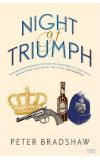
14 Jun 2013 03:08:23
From Alan Bennett to Sue Townsend to Peter Morgan, artistic attempts have been made to fathom her inner workings. In his novella, Peter Bradshaw proposes a reason why the Queen seems so grimly disengaged. What if she once, when young, broke free of protocol and encountered her future subjects as they really were? And what if the sight so alarmed and appalled her she fled back to her palace for good?
Bradshaw, who is the Guardian's film critic, takes as his starting point the documented episode on VE Day, 1945, when the two princesses, Elizabeth and Margaret Rose, slipped out to mingle incognito with the wildly rejoicing Londoners. As the book opens, the royal family is preparing to appear on the balcony before the throng. Impressive as it is, "Elizabeth had witnessed the amazing spectacle before … it seemed to her that there had been an enormous crowd out there in the Mall all her life." She flashes her earrings and is gratified by the crowd's roar of approval, then realises Winston Churchill has appeared and made his characteristic V-sign. "Instantly, Elizabeth and her family assumed benign, indulgent expressions which were invisible to the crowd."
Margaret, although the younger, is the instigator of the evening's exploit. "Oh do let's go out, Lilibet; it will be such fun … you know as well as I do that we'll never be able to square Mama and Papa ever again. It's now or never." Though in their late teens, and Elizabeth is engaged to be married, the two are still babyish, walking down a palace corridor "exchanging little blows, kicks and slaps. 'Beast.' 'Pig.' 'Sneak.' 'Wet blanket.'"
Two Guards officers, diffident Peter and grand Old Etonian Hugh, are to be the girls' escorts. "Are they foreigners?" asks Peter, still in the dark. "They have some German ancestry, but no, they are as British as you and me," Hugh replies mischievously. The men have a stiffener in a pub where they taste the odd atmosphere: there's relief and exhilaration, but also violence, resentment and desperation in the air.
Some of the crowd's optimism is misplaced: rationing will not end soon, and there are qualms about what peace will bring. Colin, a transvestite cabaret singer, is desperate for cash; Ware, a career criminal, is planning one last job in the melee. He has already flourished a gun, a device that can never be introduced into a narrative without being fired sooner or later.
Elizabeth, gamely joining a giant conga line near Trafalgar Square, is soon parted from her companions and is plunged into an underworld beyond her comprehension. Little Royal Riding Hood is lost in the wood, soon to meet fabulous beasts such as Noël Coward and Tom Driberg in its thickets, as well as monsters and witches.
This dark farce is brief, but cunningly plotted and sharply written. Reading it, I felt a little sorry for the real-life Queen. What must it be like to be the focus of such intrusive thoughts and presumptuous narratives? One thing's for certain – she will never let us know.

